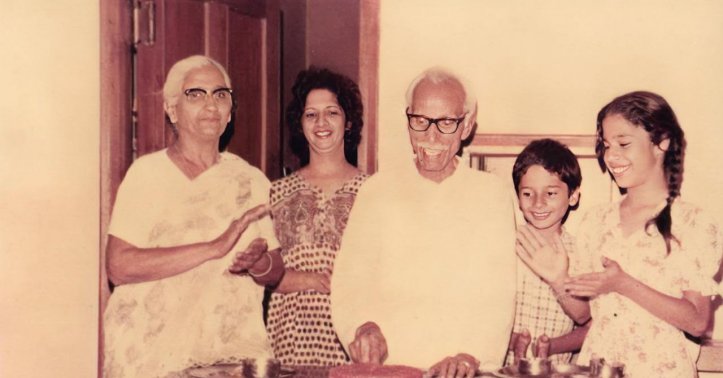
Family in Lahore and Chandigarh
If God Walked Barefoot, He’d Look Like Him
A tribute to my father-in-law, Shri Ramrakhamal Sharma.
My father-in-law, Late Shri Ramrakhamal Sharma, was born in a poor Brahmin family.
When his father died, his mother wanted to withdraw him from school as she could no longer pay school fees or buy books for him.
He was a brilliant student, so School Headmaster, Mr Daulatram Puri, a Kshatriya, promised to look after him and arrange for his expenses. Mr. Daulatram and Navi Puri had a son, Girdharilal and daughter Vidya, who were younger than Mr Ramrakha.
Mr. Ramrakha was very honest, hardworking and caring person with the result, not only Puri’s immediate family, their extended family too welcomed new member with open arms.
He would prepare Hooka for Mr.Puri, press his legs at night before he went out to sleep.
He would keep an eye on domestic work also and try to help his foster mother wherever possible.
Foster sister Vidya’s husband was very fond of mutton. Although Puri’s were Kshatriya, they were vegetarians.
Whenever Vidya’s husband visited them, my father-in-law would buy mutton, carry an earthen stove on the terrace, and cook for him in selected pans, as the same pans were not allowed to be used in the house.
He would clean all the dishes and handled them separately.
He won everyone’s heart. It seems he was given more importance than their son.
Mr Ramrakha’s marriage was arranged and his mother and siblings were also invited.
After marriage, his wife, Sheela (Prakashwati) decided to move to Lahore, as her husband had found a job with Railways in Lahore.
The Puri’s were heartbroken. They did not want to lose their foster son. However, they persuaded them to leave their first child, Karan, with them.
The couple agreed and Karan was with them till their parents shifted to Delhi before partition. It was agreed that Ramrakha a family would visit Puris every weekend
During the partition riots, my in-laws were in Delhi. My father-in-law's foster parents were stuck in Pakistan. His foster brother-in-law, who was in a very good post in a hospital, managed to engage his servant there.
He was returning home in Tonga when the same servant headed towards him with a mob. He folded his hands to spare him, but he cut his hands.When he tried to run, his legs were cut, and finally he was killed. His family was shattered. My father-in-law's foster mother wrote to him to escort the family to India( as if he were an authority), putting him at risk, too.
Despite the family’s protests, he left for Gujrawala by train.It seems he was only a Hindu with a long hair crest (shikha), a symbol of Hindu faith.Passengers wanted to kill him on the spot, but someone thought of making it a game.He was made to stand near the open door.
People started throwing their weapons at him. He would try to dodge, but finally he fell.
The train was passing through a bridge, and he fell right down near a dry stream When he regained his senses, he felt very thirsty.
The train was passing through a bridge, and he fell right down near a dry stream When he regained his senses, he felt very thirsty.
When he regained his senses, he felt very thirsty. Luckily, it started raining and he could quench his thirst with raindrops..When he started walking, someone tried to stab him, but other people stopped him, saying he would soon die, so why kill a dying man, let him suffer.He somehow reached home. His neighbours started cursing the attackers as they knew his saintly nature. He was in bed for months before he could escort his family back to India.
Vidya would often come and stay with us in Chandigarh. We were in Chandigarh for 14 years. A Muslim milkman used to drive a milk cart for at least 100 families. As soon as he would hear his whistle, he would step out either with a glass of cold water or tea. To give him a break. For him, all were the same.
He never asked for anything in return.
But he gave us everything—his values, his strength, his compassion, his way of living.
There truly will never be another like him.
And we, who had the honour to know and love him, can only try—in little ways, every day—to live like him.
He didn’t just leave behind a legacy—he left behind a light on 11 July 1985
And we try, in our little ways, to walk in it.
By Mrs.Sona Kumar








